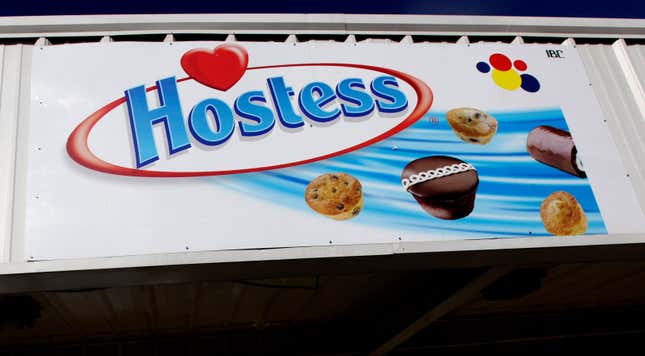
So, Twinkie-maker Hostess Brands says it is going to liquidate, after finding itself in Chapter 11 bankruptcy, again, back in January. (It only exited its last visit to the bankruptcy penalty box in 2009.)
And on the internet there’s a lot of ironical, faux-grieving for the possible disappearance of kitsch snack cakes from people who likely haven’t eaten one in decades.
But this really is bad news, especially for the 18,500 workers who may be out of a job, not to mention the rest of the communities where the company based in Irving, Texas has operated its 33 plants.
Hostess Brands has been pointing the finger at members of the Bakery, Confectionery, Tobacco Workers and Grain Millers International Union, which went on strike in September after rejecting a company offer that would have cut wages and benefits. Whether the union should have accepted the deal is really none of our business. The people there are the ones who would have to live with the pay, pension and health care the company was offering. If they had taken the deal, it’s possible that Hostess Brands could have continued limping along with a terrible business model for a few more years. Maybe.
But the fact that some workers refused to take another pay cut (Hostess had reached a deal with its largest union, the Teamsters) isn’t the problem. It’s a symptom of Hostess’ problem. And that problem is … the business operated by Hostess Brands.
We’re not saying anything earth-shattering here. Earlier this year, Chris Schmidt, an analyst at Euromonitor, told a trade magazine:
Hostess has failed to adapt to an evolving market. The rise of food blogs and cookbooks focusing on traditional dessert dishes, TV shows such as Cake Boss, Ace of Cakes and Cupcake Wars and the growth of baking as a popular hobby have led to a renaissance in cakes and pastries. Hostess’s brands, Schmidt argues, have lost their lustre.
“Consumer tastes are largely becoming more sophisticated and adventurous, two adjectives that absolutely no one associates with Twinkies,” he tells just-food. “Hostess’s once-iconic brands are increasingly viewed as cheap, unhealthy, and outmoded. Hostess’s flavour innovation has concentrated almost entirely on new product launches, many of which haven’t caught on well, and the company has been hesitant to make any sort of change to their top-selling brands. Add to this stasis the company sleeping through the health and wellness trends of fewer processed ingredients and lower calorie counts, and it is no wonder the company has struggled to increase sales.”
Analysts at credit rating firm Moody’s didn’t see much progress from Hostess in its fight against larger bakery companies such as Grupo Bimbo and Flowers Foods. Back in February, in an update on the baked goods industry, they wrote:
It’s likely that struggling Hostess—which filed for bankruptcy in January—will lose the most market share. Hostess is likely to come under more earnings pressure as Grupo and Flowers increase their presence and may need to sell assets to survive. Other smaller regional private label bakery companies could also see already-thin profits turns to losses if a price war breaks out or wheat prices rise.
Back in July, Fortune published a sweeping piece about the train wreck that Hostess had become. What’s stark — besides the ridiculous levels of debt the company piled up — is how little of the story discusses any effort from management to find a product base with growing demand and healthy—zing!—profit margins. Twinkies ain’t it.
Now management wants to point the finger at labor, which only underscores the fact that they were not good enough business-people to do anything other than squeeze their workers for money. Most businesses turn to another group of people to generate cash. They’re called customers.



